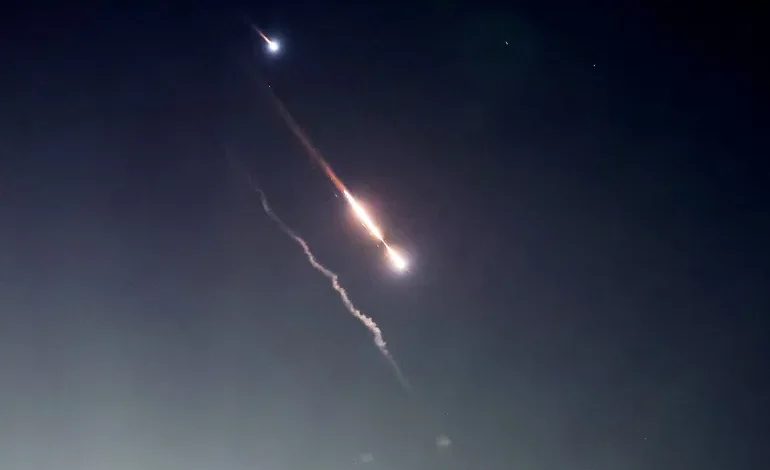Iran launches hundreds of missiles, drones in first direct attack on Israel

Iran has launched hundreds of missiles and drones at Israel in its first direct attack on Israeli territory, in a retaliatory strike that wounded a seven-year-old girl and caused minor damage at an Israeli military facility.
The attack late on Saturday night set off air raid sirens in cities across Israel, including in Tel Aviv and West Jerusalem, and explosions were heard as Israeli air defences intercepted the projectiles.
The Israeli military said the Iranian salvo consisted of more than 300 “killer drones, ballistic missiles and cruise missiles”, but that 99 percent were intercepted, with help from forces from the United States and the United Kingdom.
The launches came from Iran, as well as from Iraq and Yemen, it said.
“A small number of hits were identified, including at an [Israeli military] base in southern Israel, where minor damage was caused to infrastructure,” it added.
Iran’s Islamic Revolutionary Guards Corp (IRGC) confirmed the attack, saying it launched the drones and missiles under the operation “True Promise” as part of the punishment for “the Zionist entity’s crime of targeting the Iranian consulate in Syria” on April 1.
The raid in Damascus killed 12 people, including two senior generals in the IRGC’s elite Quds force.
Israel has neither confirmed nor denied responsibility for the consulate attack.
With the missiles and drone attack, Iran’s mission to the United Nations said it now deemed the matter “concluded” and warned the Israel of a “considerably more severe” response should the “Israeli regime make another mistake”.
The escalation comes six months into Israel’s war on Gaza, which has driven up tensions in the region, spreading to fronts with Lebanon and Syria and drawing long-range fire at Israeli targets from as far away as Yemen and Iraq.
Ahead of the Iranian response, Iraq, Jordan and Lebanon announced temporarily closing their airspace, while Syria also put on high alert its Russian-made Pantsir ground-to-air defence systems around Damascus and major bases, according to the Reuters news agency.
Earlier on Saturday, Iranian armed forces seized a container ship linked to Israel near the Strait of Hormuz.
Western countries condemned Iran’s actions, including the US, UK, Czech Republic, Denmark, France, Mexico, the Netherlands and Norway. Egypt and Saudi Arabia meanwhile called for restraint.
US President Joe Biden cut short a weekend stay at his Delaware beach house to meet with his national security team at the White House on Saturday afternoon, returning to Washington minutes before Israeli officials confirmed that they had detected drones being launched toward their territory from Iran.
He convened a principals meeting of the National Security Council in the White House Situation Room to discuss the unfolding situation, the White House said, before speaking with Israeli Prime Minister Benjamin Netanyahu late on Saturday.
“I told him that Israel demonstrated a remarkable capacity to defend against and defeat even unprecedented attacks – sending a clear message to its foes that they cannot effectively threaten the security of Israel,” Biden said.
Biden added that he would convene a meeting of the Group of Seven advanced democracies on Sunday “to coordinate a united diplomatic response to Iran’s brazen attack”.
The Pentagon meanwhile reported that Defense Secretary Lloyd Austin had spoken with his Israeli counterpart “to discuss urgent regional threats … and made clear that Israel could count on full US support to defend Israel against any attacks by Iran and its regional proxies.”
United Nations Secretary-General Antonio Guterres condemned Iran’s attack, saying he was “deeply alarmed about the very real danger of a devastating region-wide escalation.”
Russian Deputy UN Ambassador Dmitry Polyanskiy said on the Telegram social media app that in addition to a letter from Israel, the Security Council had received one from Iran asserting its attack was within the U.N. Charter framework governing the right to self-defence.










